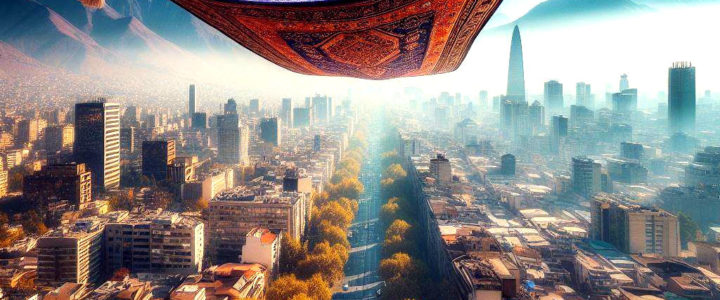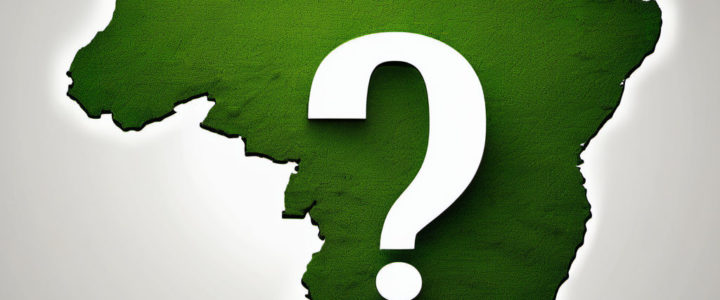Posted on YouTube: December 31, 2023
The show is called: Window on Palestine
Warning: HispanTV is an Iranian-Venezuelan propaganda outlet
Of course, in politics, Red usually stands for leftist extemism. Green usually stands for Islamic extremism. One would think they would be at opposite ends of the political spectrum.
In Chile, they are mixing.
Why?
Because Chile has the largest community of Palestinians outside the Arab world. They are called Chilestinos, and almost all of them are Christian. They number 500,000 and are roughly three times the number of Christians left in the Holy Land.
And they have a hero: Daniel Jadue, a leftist politician in Recoleta, a neighborhood in the capital province of Santiago, Chile.
Jadue was born into a Palestinian Christian Chilean (Chilestino) family. And, most notably, he is strongly anti-Zionist.
Big deal, one might say, but he is one of Chile’s most powerful politicians and media personalities. He has made a name for himself.
In the year 2020, the Simon Wiesenthal Center listed his behavior as one of the ten worst antisemitic incidents of the year.
For your knowledge (and horror), HispanTV, which is an Iranian-Venezuelan propaganda outlet is broadcasting and netcasting the political exploits of this Daniel Jadue.
Source: Simon Wiesenthal Center: SWC’s Top Ten Worst Global Anti-Semitic Incidents for 2020
…
Architect Daniel Jadue is the mayor of Recoleta, part of Santiago, the capital. Jadue, a member of the Communist Party, is a national figure and mentioned as a potential future President. Using municipal funds to finance pro-BDS and antiIsrael activities, Mayor Jadue targets the Jewish community with pernicious smears echoing The Protocols of the Elders of Zion.
He charges Jews control of the media and dual loyalty: “It is an insult that the State of Israel through its agents here in Chile wants to import the strife” … “they have to learn and define if they are Chilean citizens.” Last year, Recoleta’s Municipal Council passed a resolution stating, “Palestinian people have been the victim of a deliberate plan of violence and terror by armed Zionist groups …” Jadue insists, “… The leaders of the Jewish community in Chile act on behalf of the State of Israel in Chile…,” adding, “I get along very well with the Jews, with the Zioniist I have certain problems.” Jadue is always referring to Chile’s Jews as the “Zionist” community of Chile.
…
Read More
Iran’s HispanTV (which operates out of Venezuela) is lionizing Jadue in some recent reports and trailers.
Think about it. A Chilean politician landed on the Simon Weisenthal’s Top Ten List of Antisemitic Incidents.
In the USA, this guy’s career would be over in a heartbeat. In Chile, Jadue actually ran for president and was a serious contender in 2021, in spite of the Simon Wiesenthal Center’s condemnation of his behavior.
Recently, he got into more trouble with the Jewish Community in Chile.
Source: La Tercera (The Third): He is wrong and offends many”: Jewish Community of Chile repudiates Jadue’s statements against ‘left-wing Jews’
Hope Navarrete
Jan 2, 2024Translated by Google
The group also criticized the position of Minister Camila Vallejo, who during the morning assured that it was “not up to the government” to enter into this controversy. “The spokesperson is wrong, this is not an ‘international’ issue, because we are talking about Chileans of Jewish origin, not the Middle East conflict,” she noted.
…
Un abrazo a todos y todas y que el próximo 2024 sea un año de mayor conciencia, fraternidad y trabajo con la comunidad. Tengo plena certeza de que seguiremos avanzando para terminar con los abusos y las injusticias. Y no olvidemos a Palestina 🇵🇸! #AñoNuevo
— Daniel Jadue (@danieljadue) January 1, 2024
This is no minor politician in Chile – which is now a first world country.
This guy is a major player in Chilean politics, much bigger than the squad in American politics. This guy has a brain, and a power base. And the Chilean Jewish community is not happy with him.
He recently gave a talk where he presented the book: Zionism: the Ideology that Exterminates.
We have no one like this in American politics – at least not this strong.
Posted on YouTube: June 24, 2021
(Even after he was listed as antisemitic)
Now, it is true that there is a conservative element that is presently resisting this, but for how long?
And yes, the JEWISH COMMUNITY IS VERY UPSET WITH THIS.
So why isn’t the Jewish community fighting back?
They are trying to, but the Palestinians in Chile outnumber the Jews about 25 to 1. Though Chile has a large community of Jews for South America, they only number around 20,000 to the Chilestino’s numbers of approximately 500,000.
Moreover, the Palestinian community in Chile is rich and well off.
The advantage is totally on the Chilestino side.




